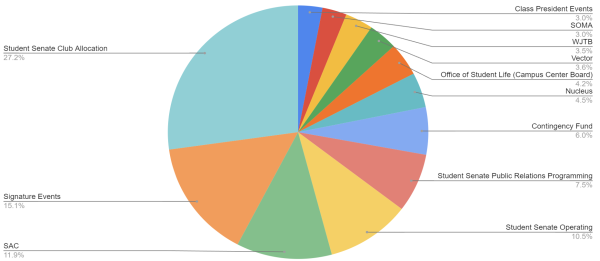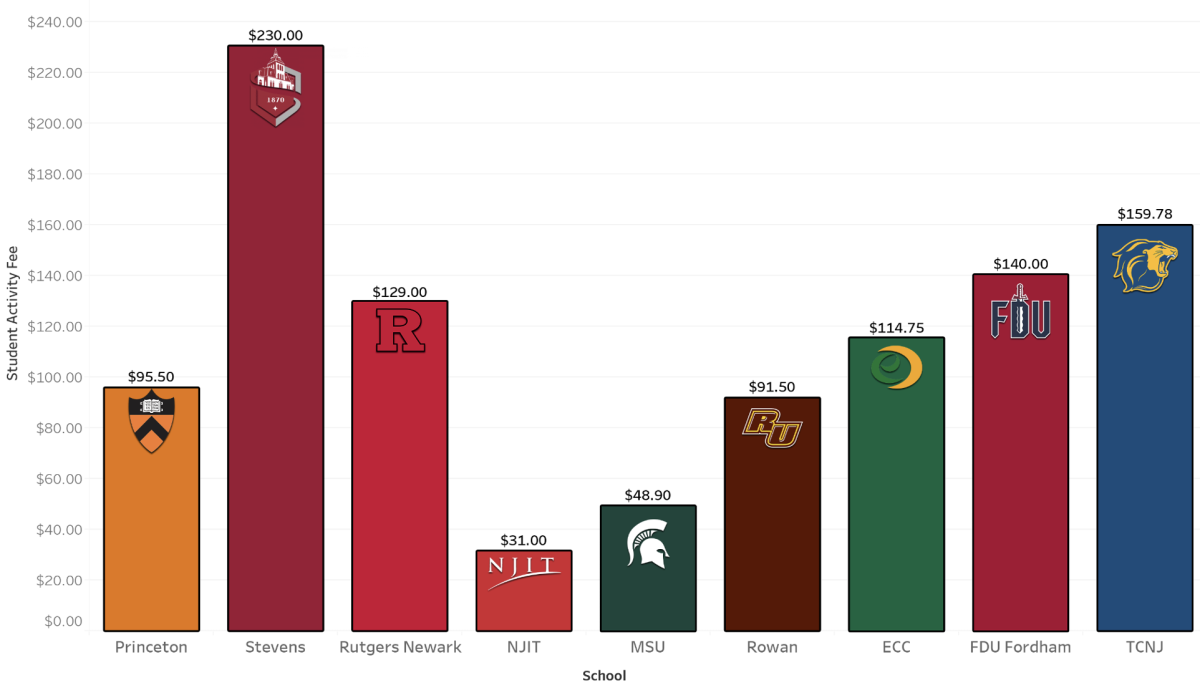In every enrolled undergraduate student’s payment portal for NJIT, they can see a section called the Student Activities Fee. This is a portion of what students pay to the university that is allocated to Student Life; the money is used to fund clubs, sponsor on-campus events, and subsidize the conferences and competitions in which student organizations participate.
On Dec. 6, the Student Senate voted on a proposed increase in the Student Activities Fee. The motion passed in a 22-8 decision, resulting in an approved increase in the fee from $31 to $73.50 per semester for full-time undergraduate students.
As NJIT has grown in rankings, the university’s Student Activities Fee has lagged behind that of its peers. In Spring 2020, NJIT students paid $55 per semester for the fee; a result of the COVID-19 pandemic, this amount was reduced to $31. Now, three years later, campus life has expanded beyond pre-pandemic levels of student involvement, and the update to the fee reflects this growth.
The proposed $73.50 fee is on par with other local universities. For example, Rutgers-Newark receives an average of four times the current level of funding per student compared to NJIT. This proposed adjustment puts NJIT in the same league as its peers in New Jersey, and practically speaking, increasing this fee means that events will see an uptick in terms of quantity and quality.
It is important to note that raising the fee will not directly increase tuition. The NJIT Office of the Bursar has planned for a 1.2% increase in tuition for the 2024-25 fiscal year, and this proposal supports a larger allocation of these funds to be put into the hands of students as an investment towards campus life.
Student organizations, a term interchangeable with clubs, receive the majority of their funding through the Student Senate Club Allocation, with principal funding being decided using a tier and point system. The funding caps for the tiers were introduced in 2019 and have been increased only once, during the summer of 2020, with many organizations opting to subsidize their budgets with grant requests to offset rising costs. Tier 1 organizations currently receive a maximum of $8,000 per academic year, with Tiers 2, 3, and 4 receiving $5,000, $3,000, and $1,500, respectively.
In contrast, Gourmet Dining Services catering, which many clubs utilize to cater their on-campus events, sees a yearly price increase of 5-10%; reviewing the menu from last year in comparison to this year’s reveals this increase. Previously, Senate-funded clubs needed to cater their events from Gourmet Dining Services, with the only exceptions being cultural events and those with dietary restrictions. In 2022, this restriction was walked back, with clubs able to cater from external vendors without filling out the External Catering Request Form, allowing more flexibility in what clubs could offer to students on campus.
With a growing number of clubs on campus, Senate has had to reconsider funding for other line items — such as the Spring Concert, which falls under Signature Events — due to rising club allocations. The Signature Events allocation saw a $50,000 reduction compared to the previous fiscal year; this section also funds events like Homecoming.
In previous years, Senate has been able to pull from its residual fund balance, but that well is not bottomless.
In the proposed budget allocation for the 2024-25 fiscal year, Senate aims to restore the Signature Events line to pre-COVID-19 inflation-adjusted levels, while providing a greater pool of funds for club grants. To support this funding adjustment, a few relevant bylaw updates have come before Senate:
On Feb. 28, the following bylaw changes were put in place:
Students are prevented from being charged for events run using Student Activities Fees (excluding conferences and events where student funds are used to subsidize expenses).
Clarification of wording
On Mar. 6, the following bylaw changes were put in place:
A $300 cap on spending for transitionary dinners for executive boards was put in place.
A 20% cap on operational assets not used for events was instituted for organizations.
Grant caps have been raised, allowing student organizations to request up to $3,000 across all categories.
Grant hearings, while previously occurring biweekly, were shifted to a weekly process based on the discretion of the Senate Vice President of Finance, which currently is second-year financial technology major Nahomy Zuniga.
Additionally, organizations are not guaranteed funding after becoming recognized. When a club is revived, it will not retain its previous tiering or budget and will be treated as a new club. This change was implemented this semester to provide a better scope for New Student Organizations’ (NSOs) financial needs, and NSOs can still request grants.
Having been in effect for much of the past academic year, changes to the grant system that enable the bypassing of funding caps in the financial bylaws have proven incredibly useful. Student organizations seek to elevate NJIT’s impact by attending conferences and competitions, but organizations struggle with the $500 per-student funding cap.
One student organization, NJIT’s chapter of International Game Developers Association, sent four individuals to a professional development conference in California. Club president and third-year computer science major Alex Patchedjiev commented, “The $500 per person limit was [difficult to navigate]. It drove us to seek external funding, particularly through [our Academic department]. That complicated the process…Hotel and flight bookings which took an hour [now had to be cleared through] multiple different departments…consolidating it to just Senate would improve things dramatically.”
Changes to the grant system this year served to lighten the financial burden placed on student organizations while providing funding to approve more ambitious projects through the student body. The increase in funding for the coming school year will serve the same purpose.
When asked for a comment on the increased fee, Zuniga said, “We are deeply pleased with the raising of the fee. Our campus is full of amazing clubs and organizations that depend on these funds to function successfully and provide their members with the best experience possible.
“This increase allows for our clubs to function at their highest potential, our students to continue utilizing our clubs to find like-minded people and build friendships on campus, create their own clubs to build their community, and increase opportunities for scholarship and similar programs. It is my hope that this increase will allow clubs to have larger budgets, more access to grants, encourage them to host larger events, and be even more successful in their ventures.”
Below is the proposed budget for the 2024-25 fiscal year:

Student Senate Club Allocation: The principal funding for all Senate-recognized tiered clubs at NJIT.
Signature events: Large-scale events sponsored by Student Senate, such as Homecoming and the Spring Concert.
Student Activities Council (SAC), Society of Musical Arts (SOMA), WJTB Radio, The Vector, Nucleus Yearbook: Each of these is a University Serving Organization, which operates outside the tier system and are set to be given a fixed budget for the academic year.
Student Senate Operating Budget: Internal operating budget that funds events like the yearly Student Senate retreat and Senate general body meetings.
Student Senate Public Relations Programming: The principal funding for all Student Senate-operated events like Commuter Lunches and the Multicultural Fest.
Contingency fund: A deposit to replenish the Senate’s residual fund balance, used in emergency cases.
Campus Center Board: A once-yearly line paid to the Office of Student Life which provides financial support for their operations.
Class President Events: Used for Senior Formal and other events specifically for the graduating class.
The adjustment of the fee was brought before NJIT’s Board of Trustees during the Nov. 27, 2023 open hearing where NJIT President Dr. Teik C. Lim and Board of Trustees chair Robert C. Cohen reacted positively to the proposal.






























